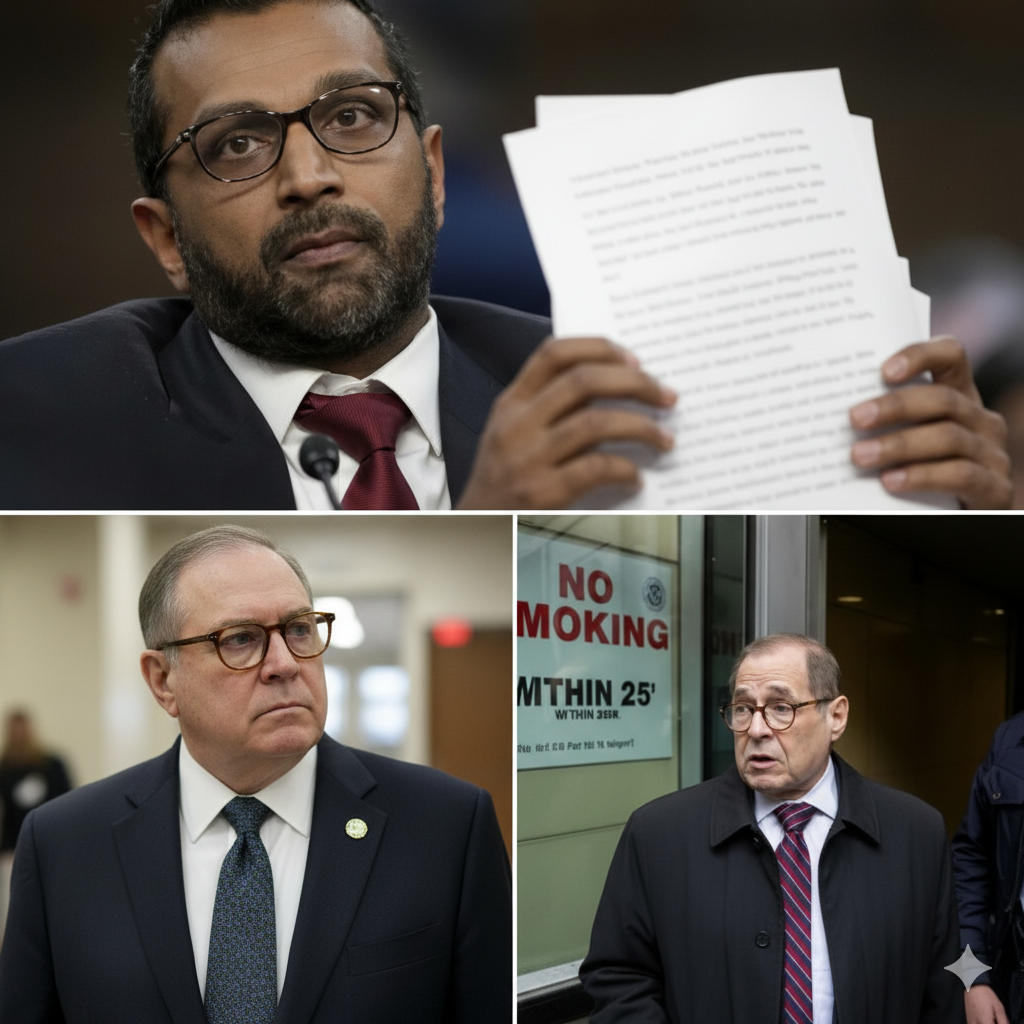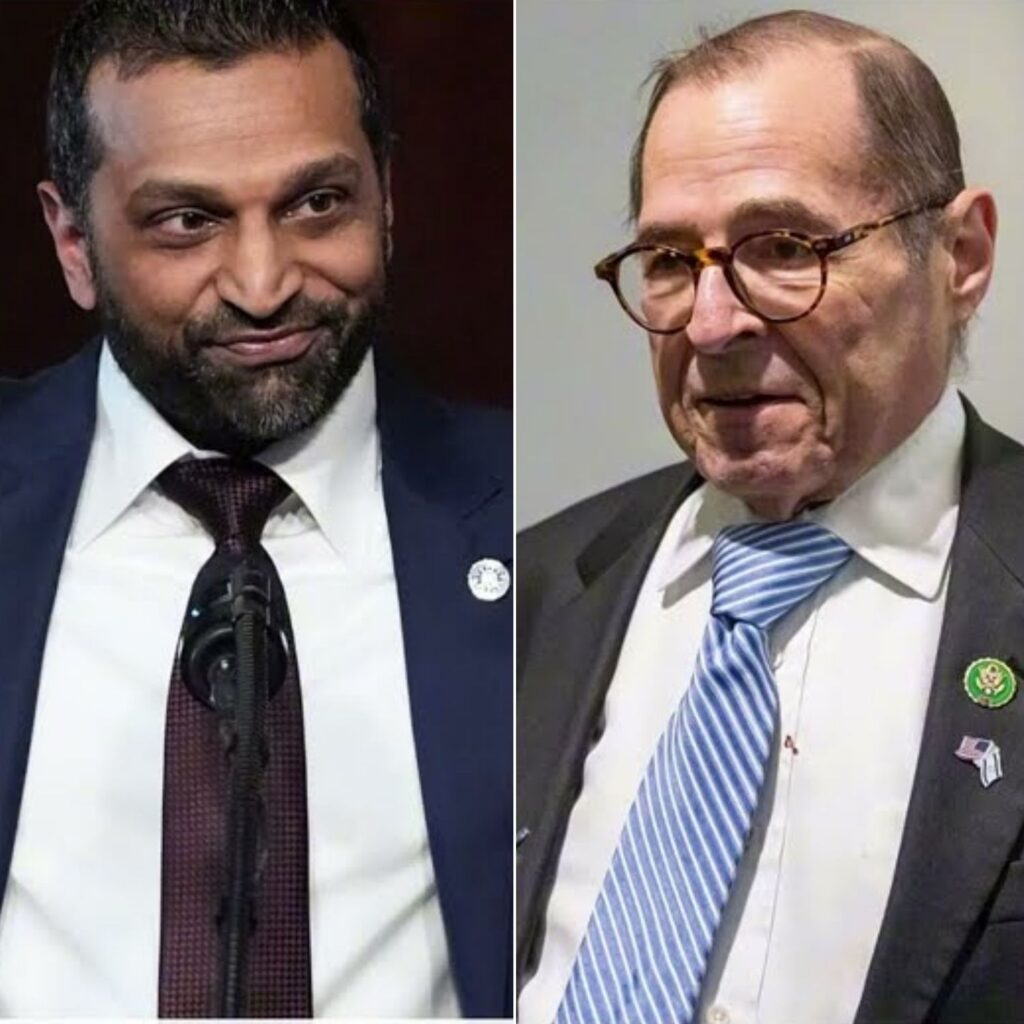In the hallowed chambers of the House Judiciary Committee, a dramatic scene unfolded that will be remembered in political history as a masterclass in accountability. Congressman Jerry Nadler, a veteran legislator long regarded as a stalwart of Democratic oversight, entered the hearing room with his usual confidence, exuding the air of a man accustomed to directing investigations rather than being the subject of one. Yet, within moments, that confidence crumbled, replaced by a stark confrontation with reality—a meticulous, public dismantling of his decades-long narrative.

Across the room stood Kash Patel, a calm yet relentless figure, armed not with theatrics, but with irrefutable evidence, dates, and names. In front of the entire nation, Patel did not merely speak; he surgically dismantled Nadler’s defenses, exposing every inconsistency and contradiction with the precision of a seasoned prosecutor. What followed was a systematic takedown of Nadler’s career, a moment where oversight turned inward and held the powerful accountable.
The Evidence Mounts
The hearing began with the presentation of a thick, imposing folder stamped boldly: “Oversight, Suppression, and Political Weaponization: Subject—Rep. Gerald Nadler.” Inside were hundreds of pages of documents, subpoenas, internal memos, and correspondence that painted a troubling portrait of partisan manipulation.
Patel’s delivery was measured, almost clinical, but every word carried weight. He highlighted the stark numbers that encapsulated Nadler’s selective application of oversight:
-
43 subpoenas issued under Nadler’s leadership—42 targeted at Republicans, 0 at Democrats.
-
Ignored complaints and referrals involving high-profile Democratic figures, including Hunter Biden, Hillary Clinton, and Fonnie Willis.
-
Suppressed internal audits, diverted contracts to Democrat-aligned firms, and repurposed public funds for politically motivated initiatives.
Each piece of evidence was methodically laid out, forming a damning narrative: oversight under Nadler was not impartial; it was a tool for protection of allies and punishment of political opponents. “You didn’t just break trust,” Patel said, eyes locked on Nadler. “You rewrote the rules so you’d never be held to them.”
As the chamber remained silent, the weight of the revelations settled like a tangible force. For years, Nadler had wielded oversight as a sword; now, the sword turned, piercing the armor he thought impenetrable.

Federal Consequences and the DOJ Referral
The hearing concluded with Patel submitting a formal criminal referral to the Department of Justice, a document outlining serious allegations that would trigger a federal investigation:
-
Obstruction of congressional oversight
-
Misuse of public funds
-
Suppression of whistleblower testimony
-
Ethical misconduct
Within hours, headlines splashed across every major news outlet, declaring Nadler’s fall from grace. The DOJ confirmed the initiation of a federal investigation. Nadler’s own party distanced themselves; donors withdrew support, and constituents voiced frustration and disillusionment. For a man who had long shaped narratives of accountability for others, the reckoning was swift and unrelenting.
The Collapse of a Political Narrative
In the days that followed, the House acted decisively. Nadler was stripped of his committee leadership, followed by a censure vote that was overwhelmingly in favor. Editorial boards that had once defended his actions now openly called for resignation, and polling indicated a surge of primary challengers eager to seize an opening left by the collapse of Nadler’s authority.
Pam Bondi, the architect of the inquiry, captured the sentiment succinctly: “This isn’t a political victory. It’s a constitutional correction.”
The dismantling of Nadler’s carefully curated image was almost poetic. A man who had long been seen as the gatekeeper of justice now found himself ensnared by the very system he had once manipulated. The illusion of partisan immunity had been shattered, replaced by an unflinching lesson: accountability is not optional, and no political shield can protect wrongdoing indefinitely.
A Legacy in Ruins
Nadler’s final statements in the chamber were defensive, hollow echoes of the confidence he once projected. The man who commanded respect with his gavel now faced the consequences of a career steeped in selective oversight. The paper trail left behind by his own actions became the instrument of his undoing.
Analysts noted that Nadler’s downfall was not sudden—it was inevitable. Years of decisions, carefully calculated to protect allies and target opponents, had accumulated into an overwhelming body of evidence. And when that evidence was laid bare before the nation, the public witnessed the collapse of a legacy built on both influence and manipulation.
“He thought no one was watching,” one political commentator observed. “But the nation was watching, and the evidence left him nowhere to hide.”
Public Reaction: Outrage and Vindication
The fallout was immediate. Social media exploded with commentary, ranging from shock and anger to vindication. Citizens who had long criticized Nadler for perceived bias felt validated; others debated the broader implications for oversight and governance. News outlets across the spectrum dissected every facet of the hearing, replaying key moments and analyzing Patel’s meticulous presentation.
From Washington to state capitals, the conversation was clear: the political system could no longer be seen as a shield for partisanship. Nadler’s actions had consequences, and the public was determined to see justice carried out.
The Broader Implications for Oversight
Nadler’s case underscores a larger issue facing American governance: the integrity of oversight mechanisms. When oversight becomes weaponized, the tools designed to ensure transparency and accountability are instead turned into instruments of power consolidation. Nadler’s downfall serves as a cautionary tale for lawmakers across the spectrum, a reminder that public trust is fragile and can be eroded by selective enforcement and ethical lapses.
Legal scholars noted that the DOJ investigation could set a precedent for how congressional oversight is conducted, emphasizing impartiality and accountability over political maneuvering. Kash Patel’s methodical presentation highlighted the importance of evidence-based scrutiny, demonstrating that no official, regardless of tenure or party affiliation, is above the law.
The Human Element
Beyond the political theater, the Nadler hearing revealed a deeply human story: ambition, miscalculation, and the eventual confrontation with consequences. Nadler, once the master orchestrator of hearings and inquiries, experienced the disorienting reversal of roles—becoming the subject of scrutiny he had long directed at others.
Observers described the chamber as tense, almost cinematic, as Patel calmly, systematically presented facts that left no room for evasion. The spectacle was not merely entertainment; it was a vivid demonstration of the intersection between power and responsibility, a lesson in governance that unfolded in real time before a national audience.
Lessons Learned and the Road Ahead
In the wake of Nadler’s downfall, the political landscape is poised for change. Questions abound regarding committee leadership, oversight protocols, and the role of partisanship in investigations. Lawmakers and citizens alike are calling for reforms that ensure transparency, fairness, and accountability are maintained without regard to political affiliation.
The House Judiciary Committee has pledged to review selection processes and procedural guidelines to prevent future abuses. Meanwhile, the DOJ investigation continues, promising to delve deeper into potential misconduct and ethical breaches. For Nadler, the road ahead is uncertain, marked by legal scrutiny, public criticism, and the loss of political capital that once seemed untouchable.
Conclusion: Justice Over Partisanship
Jerry Nadler’s downfall was neither a scandal of exaggeration nor a fleeting media sensation—it was the inevitable consequence of actions meticulously documented and exposed under the unforgiving gaze of oversight. The hearing revealed a central truth: accountability is the cornerstone of democracy, and no individual, regardless of stature or influence, is immune.
As Nadler’s story reverberates across Washington and the nation, it stands as a stark reminder that oversight is not a partisan tool—it is a responsibility. Justice, when pursued diligently, does not discriminate. And in the case of Jerry Nadler, the ledger of history records that even the most powerful are ultimately accountable to the law and to the people they serve.
The nation watched as the gatekeeper became the scrutinized. The illusion of immunity dissolved, leaving only the enduring principle: power demands responsibility, and every action has a consequence.